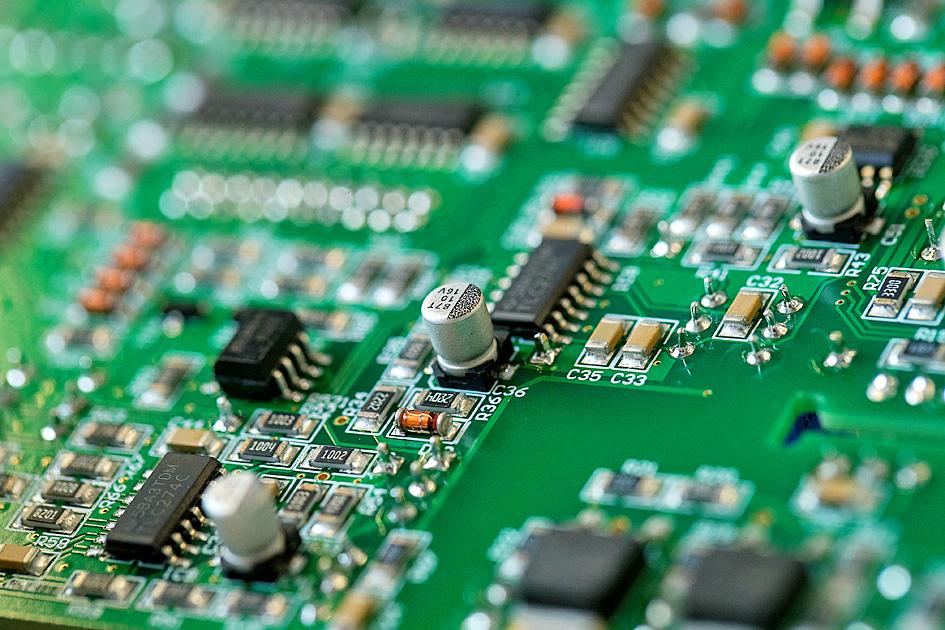The New Taiwan dollar’s continued appreciation against the US dollar would drag on printed circuit board (PCB) manufacturers’ earnings this quarter, analysts said, adding that high costs for raw materials and shipping driven by restocking demand would also affect their business.
However, PCB makers’ gross margins would be less strongly affected, as many firms in the sector plan to raise prices to reflect cost pressure, Yuanta Securities Investment Consulting Co (元大投顧) said in a note last week.
“We estimate that if the NT dollar’s appreciation rises by one dollar against the greenback, PCB makers’ core earnings would drop 10 percent, while a 10 percent copper price hike would reduce their earnings by 5 percent,” Yuanta analysts led by Liu Szu-liang (劉思良) said in the note.

Photo: Krisztian Bocsi, Bloomberg
Raw materials, including copper, adhesive solutions and gold, account for 40 to 45 percent of PCB makers’ production costs, with copper alone making up 15 to 20 percent, they said.
In terms of orders, Yuanta analysts said that the outlook remains positive for companies making Ajinomoto build-up film substrates and automotive PCBs, as well as those supplying PCBs for laptops, tablets, servers and gaming devices.
That includes Chin-Poon Industrial Co (敬鵬工業), Dynamic Electronics Co (定穎電子), Apex International Co (泰鼎國際) and Tripod Technology Corp (健鼎科技) in the field of automotive PCB business, Gold Circuit Electronics Ltd (金像電子) and Elite Material Co (台光電子材料) in the server PCB segment, they said.
Compeq Manufacturing Co (華通電腦), Unitech Printed Circuit Board Corp (燿華電子), Nan Ya Printed Circuit Board Corp (南亞電路板) and Kinsus Interconnect Technology Corp (景碩科技), which make PCBs or IC substrates for true wireless stereo earphones, would also be affected, they added.
“The ABF substrates and automotive PCB capacity is fully booked, while orders for laptop, tablet, server and gaming PCB are at high levels,” the analysts said.
“Bismaleimide-triazine resin substrates and Chinese handset PCBs have also seen strong orders leading up to the Lunar New Year holiday, with handset sales during the holiday to determine the volume of post-holiday orders,” they said.
Last month, 39 listed PCB makers reported that their combined revenue grew 23.97 percent year-on-year to NT$68.99 billion (US$2.43 billion), data released on Jan. 12 by the Taiwan Printed Circuit Association (台灣電路板協會) showed.
Makers of substrates and rigid PCBs saw their combined revenue increase 9.91 percent to NT$43.696 billion, and revenue of those making flexible PCBs totaled NT$25.297 billion, up 59.15 percent, the data showed.
For all of last year, listed PCB makers’ revenue grew 5.62 percent from 2019 to NT$667.22 billion, with Nan Ya, Kinsus Interconnect, Best Friend Technology Co (友銓電子), Gold Circuit and Allied Circuit Co (博智電子) reporting more than 20 percent growth in revenue on the back of solid demand for IC substrates and server PCBs, the association said.

Taiwan Semiconductor Manufacturing Co (TSMC, 台積電), the world’s biggest contract chipmaker, booked its first-ever profit from its Arizona subsidiary in the first half of this year, four years after operations began, a company financial statement showed. Wholly owned by TSMC, the Arizona unit contributed NT$4.52 billion (US$150.1 million) in net profit, compared with a loss of NT$4.34 billion a year earlier, the statement showed. The company attributed the turnaround to strong market demand and high factory utilization. The Arizona unit counts Apple Inc, Nvidia Corp and Advanced Micro Devices Inc among its major customers. The firm’s first fab in Arizona began high-volume production

VOTE OF CONFIDENCE: The Japanese company is adding Intel to an investment portfolio that includes artificial intelligence linchpins Nvidia Corp and TSMC Softbank Group Corp agreed to buy US$2 billion of Intel Corp stock, a surprise deal to shore up a struggling US name while boosting its own chip ambitions. The Japanese company, which is adding Intel to an investment portfolio that includes artificial intelligence (AI) linchpins Nvidia Corp and Taiwan Semiconductor Manufacturing Co (TSMC, 台積電), is to pay US$23 a share — a small discount to Intel’s last close. Shares of the US chipmaker, which would issue new stock to Softbank, surged more than 5 percent in after-hours trading. Softbank’s stock fell as much as 5.4 percent on Tuesday in Tokyo, its

COLLABORATION: Softbank would supply manufacturing gear to the factory, and a joint venture would make AI data center equipment, Young Liu said Hon Hai Precision Industry Co (鴻海精密) would operate a US factory owned by Softbank Group Corp, setting up what is in the running to be the first manufacturing site in the Japanese company’s US$500 billion Stargate venture with OpenAI and Oracle Corp. Softbank is acquiring Hon Hai’s electric-vehicle plant in Ohio, but the Taiwanese company would continue to run the complex after turning it into an artificial intelligence (AI) server production plant, Hon Hai chairman Young Liu (劉揚偉) said yesterday. Softbank would supply manufacturing gear to the factory, and a joint venture between the two companies would make AI data

The Taiwan Automation Intelligence and Robot Show, which is to be held from Wednesday to Saturday at the Taipei Nangang Exhibition Center, would showcase the latest in artificial intelligence (AI)-driven robotics and automation technologies, the organizer said yesterday. The event would highlight applications in smart manufacturing, as well as information and communications technology, the Taiwan Automation Intelligence and Robotics Association said. More than 1,000 companies are to display innovations in semiconductors, electromechanics, industrial automation and intelligent manufacturing, it said in a news release. Visitors can explore automated guided vehicles, 3D machine vision systems and AI-powered applications at the show, along